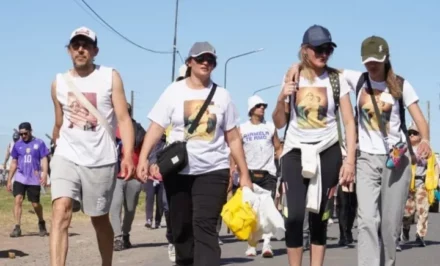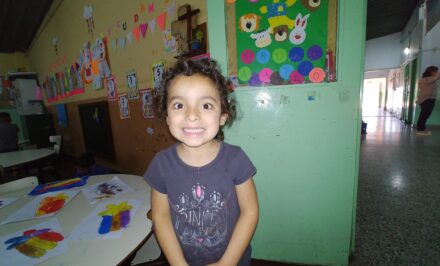 org. Every part of the Church, and many others outside of her – believers or non-believers – have received Pope Francis` clear and hope-filled words. They are also words that motivate us to assume the responsibility we all have to build a world in accordance to the Will of God, in the strength of the Spirit and through the way of Christ. Cardinals and bishops, priests, men and women religious, novices and seminarians, families, the youth and elderly, communities and institutes have received this challenge to go out “onto the street” to take – not a utopian hope – but concrete deeds in living evangelization projects to all men and women wherever they may be. And if they are on the “outskirts” then we have to go there, with all the risks and dangers it may include. He repeats to us constantly: I prefer an injured church, because she goes out to serve, to a Church that is sick because of her self-absorption. Testimony to this can be found in the section of Schoenstatt.org where on a weekly basis texts are selected which motivate us on our own pilgrimage toward the 2014 Jubilee. Undoubtedly, because we are the Church, these words are also directed to us. How happy must our Father not be with this missionary impetus which is given to us from the very heart of the Church! (Fr. José María García)
org. Every part of the Church, and many others outside of her – believers or non-believers – have received Pope Francis` clear and hope-filled words. They are also words that motivate us to assume the responsibility we all have to build a world in accordance to the Will of God, in the strength of the Spirit and through the way of Christ. Cardinals and bishops, priests, men and women religious, novices and seminarians, families, the youth and elderly, communities and institutes have received this challenge to go out “onto the street” to take – not a utopian hope – but concrete deeds in living evangelization projects to all men and women wherever they may be. And if they are on the “outskirts” then we have to go there, with all the risks and dangers it may include. He repeats to us constantly: I prefer an injured church, because she goes out to serve, to a Church that is sick because of her self-absorption. Testimony to this can be found in the section of Schoenstatt.org where on a weekly basis texts are selected which motivate us on our own pilgrimage toward the 2014 Jubilee. Undoubtedly, because we are the Church, these words are also directed to us. How happy must our Father not be with this missionary impetus which is given to us from the very heart of the Church! (Fr. José María García)
![]()
WEEK 10/2014
“I wish to come into your homes”
First words of the letter to families

Christian life is not a commercial venture, simply following Jesus… It is as if to say: ‘yes, you have left everything and you will receive many things here on earth, but with persecution. It is like a salad dressed with the oil of persecution: Always! This is Christian’s recompense and this is the path of whoever wishes to follow Jesus, because it is the path that He walked: He was persecuted! It is the path of humiliation. Paul told the Philippians: “He humbled himself. He became man and humbled himself even to death, death on a cross.” This is precisely the tone of Christian life. Also in the Beatitudes when Jesus says: “Blessed are you when people insult you, persecute you because of me.” Persecution is one of the Beatitudes. Immediately after the coming of the Holy Spirit, the disciples began to preach and immediately the persecution began. Peter was imprisoned, Stephen was assassinated, as have been so many disciples, even down to the present day. The Cross is always the Christian way! We will find many brothers, many sisters, many mothers, many fathers in the Church, in the Christian community, but we will also find persecution. This is because the world does not tolerate Christ’s divinity. It does not tolerate the preaching of the Gospel. It does not tolerate the Beatitudes. This is how persecution comes about: with words, slander, the things that were said about the early Christians, defamation, imprisonment…We forget this so easily. We think of so many Christians 60 years ago in the camps, in the Nazi and communist prisons. So many of them. For being Christians! But also today…’But today we are more cultured and these things do not happen.’ They do! Let me tell you that today there are more martyrs than in the early years of the Church.
Santa Marta 4.3.2014
The evangelist Luke tells us that the Blessed Mother and Saint Joseph, in keeping with the Law of Moses, took the Baby Jesus to the temple to offer him to the Lord, and that an elderly man and woman, Simeon and Anna, moved by the Holy Spirit, went to meet them and acknowledged Jesus as the Messiah (cf. Lk 2:22-38). Simeon took him in his arms and thanked God that he had finally “seen” salvation. Anna, despite her advanced age, found new vigour and began to speak to everyone about the Baby. It is a beautiful image: two young parents and two elderly people, brought together by Jesus. He is the one who brings together and unites generations! He is the inexhaustible font of that love which overcomes every occasion of self-absorption, solitude, and sadness. In your journey as a family, you share so many beautiful moments: meals, rest, housework, leisure, prayer, trips and pilgrimages, and times of mutual support… Nevertheless, if there is no love then there is no joy, and authentic love comes to us from Jesus. He offers us his word, which illuminates our path; he gives us the Bread of life which sustains us on our journey.
Letter to Families (published on 25 February)
Today, the economy that prevails around the world places the god of money at the centre, and not the human person, where everyone has his place, and those who do not fit in are discarded. Unwanted or troublesome children, or children whose is inconvenient are cast aside. The Spanish bishops were recently telling me about the quantity of abortions, the number made my blood go cold. They have the census figures on this. The elderly are cast aside, there is a tendency to discard them. In several countries in Latin America there is hidden euthanasia, hidden euthanasia because social projects only receive a certain amount and nothing more, and the poor old people, how can they survive. I remember visiting an old age home in Buenos Aires where the beds were all occupied, and because there were no more beds, they had put mattresses on the floor, and the old people were lying there. Can’t a country buy a bed? This is indicative of something else, not so? But they are objects to be discarded. Dirty sheets with all kinds of dirt. Because they did not have napkins the old people would eat there and wipe their mouths with the sheets. I saw this with my own eyes, I didn’t hear it from anyone. They are objects to be discarded, but this gives us an idea of what I mean and this is where I come to the young people.
Speech to the members of the Pontifical Commission for Latin America
If, however, one gives God his rightful place, that is the first place, then his love leads one to share even one’s wealth, to set it at the service of solidarity and development projects, as many examples, including recent examples, in the history of the Church illustrate. In this way, God’s Providence comes through our service to others, our sharing with others. If each of us accumulates not for ourselves alone but for the service of others, in this case, in this act of solidarity, God’s providence is made visible. If, however, one accumulates only for oneself, what will happen when God calls him? No one can take his riches with him, because — as you know — the shroud has no pockets! It is better to share, because the only thing we can take with us to heaven is what we have shared with others. The path that Jesus points towards may seem a little unrealistic with respect to the common mindset and to problems resulting from the economic crisis; but, if we think about it, this road leads us back to the right scale of values. He says: “Is not life more than food, and the body more than clothing?” (Mt 6:25). In order to ensure that no one lacks bread, water, clothing, a home, work, health, we need to recognize that all people are children of the Father who is in Heaven and, therefore, we are all brothers, and we must act accordingly. I recalled this in the Message for Peace of 1 January this year: the way to peace is fraternity — this journeying together, sharing things with one another.
Angelus 2.3.2014
Likewise, the present moment, in which the mediations of faith are increasingly scarce and there is no lack of difficulties for its transmission, it is imperative to put your Churches in a true state of permanent mission, to call those who are estranged and to strengthen the faith, especially in children. To do so, do not fail to pay particular attention to the process of initiation to the Christian life. The faith is not merely cultural heritage but a gift, a gift that is born from the personal encounter with Jesus and the free and joyful acceptance of the new life it offers us. This calls for incessant proclamation and constant animation, so that the believer is clear about his condition of being a child of God, which he received in Baptism. To awaken and enliven a sincere faith, foster the preparation for marriage and the support to families, whose vocation is to be the birthplace of a shared experience of love, the first unit of society, a transmitter of life and domestic Church, where the faith is forged and lived. An evangelized family is a valuable agent of evangelization, especially radiating the wonder that God has worked in it. Moreover, being by nature the ambit of generosity, it will promote the birth of vocations to the following of the Lord in the priesthood or consecrated life.
To the Spanish Bishops, 3.3.2014
How many young people feel this ‘call’ in their hearts to draw closer to Jesus, and are moved, are not embarrassed to kneel before Him, to publically demonstrate their faith in Jesus Christ and want to follow him, but when their hearts are filled with other things and they are not courageous enough to empty their hearts, they take a step back and that joy is transformed into sadness. Also today, there are many young people who have a vocation but sometimes something holds them back: We have to pray that the hearts of these young people can be emptied, emptied of other interests, other loves, so that the heart can become free. And this is the prayer for vocations: “Lord, send us, send us nuns, send us priests, defend them from idolatry, the idolatry of vanity, the idolatry of arrogance, the idolatry of power, the idolatry of money.” And our prayer is to prepare these hearts so that they can follow Jesus closely.
Santa Marta, 3.3.2014
Society today has a great need for a way of life that reflects the newness that the Lord Jesus has given us: brothers who love each other despite the differences…this testimony gives birth to the desire to involve ourselves in the great parable of the communion that is the Church.
To Bishops who are friends of the Focolare Movement, 27.2.2014
See all texts in “Francis for the Pilgrims 2014”
Message for World Youth Day 2014
The aim of the pilgrimage
is the renewal of the covenant of love
as a missionary and unifying creative force,
i.e. internally the renewal of the Schoenstatt Family
and externally the shaping of covenant culture.













